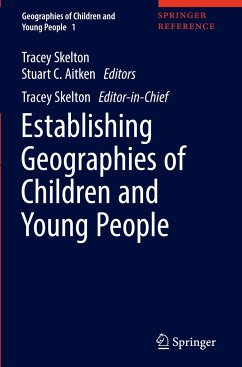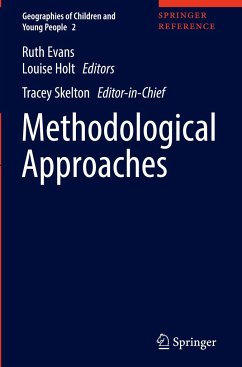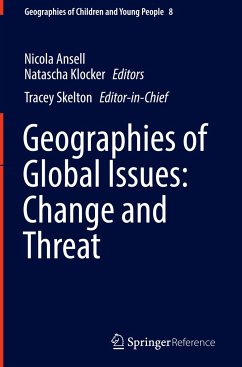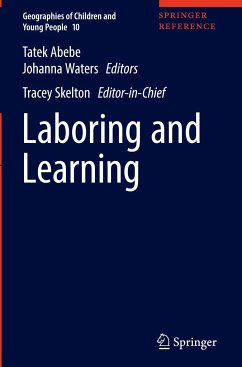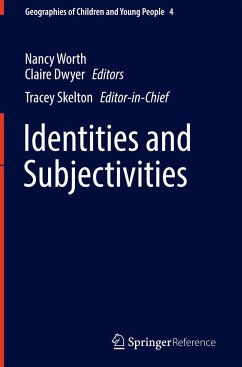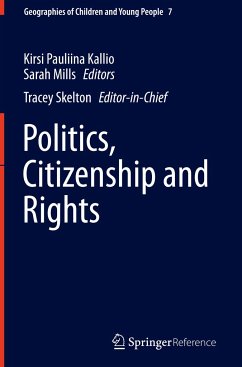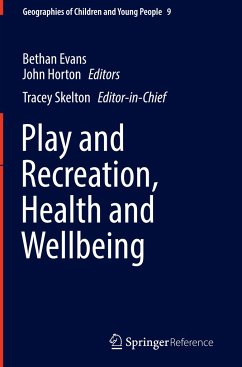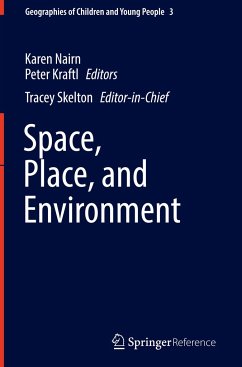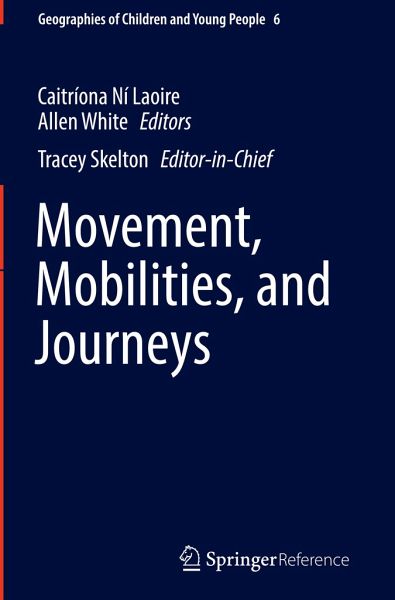
Movement, Mobilities, and Journeys
Versandkostenfrei!
Versandfertig in 6-10 Tagen
226,99 €
inkl. MwSt.

PAYBACK Punkte
113 °P sammeln!
This volume brings together a range of contributions exploring the diverse ways in which children and young people experience movements, im/mobilities and journeys at different geographical scales and in different socio-spatial contexts. It provides a snapshot of recent work within the geographies of children and young people which has engaged with emerging conceptualisations of mobility and immobility, and builds on existing scholarship on migration, movement and settlement.Topics covered include children's and young people's experiences of phenomena such as transnational migration, everyday ...
This volume brings together a range of contributions exploring the diverse ways in which children and young people experience movements, im/mobilities and journeys at different geographical scales and in different socio-spatial contexts. It provides a snapshot of recent work within the geographies of children and young people which has engaged with emerging conceptualisations of mobility and immobility, and builds on existing scholarship on migration, movement and settlement.
Topics covered include children's and young people's experiences of phenomena such as transnational migration, everyday mobility, social im/mobilities, homelessness, settlement, navigations of belonging, educational mobility, medical travel, citizenship, trafficking, labour migration, borders and boundaries. The collection is notable for the wide range of geographical contexts represented, including global South and North, and in the variety of types of movements examined - from local to global mobilities, everyday to life-changing journeys, and incorporating movements bound up in different ways with processes of socio-spatial inclusion and exclusion.
A number of core themes are highlighted in the volume. All of the contributions are attentive to children's and young people's subjectivities, agency and perspectives in the context of an adult-dominated world. Together, they highlight: firstly, the complexities of children's mobilities and the need to move beyond over-simplified and often dichotomized understandings of children's mobilities and migrations; secondly, the importance of recognising the diversity of geographical scales in children and young people's movements, and in particular, of the ways in which small-scale movements intersect with global mobilities and migrations in children's and young people's lives; thirdly, the interdependent and relational nature of children's and young people's mobilities and migrations; and finally, the importance of social, material, political and family contexts in understanding how children and young people experience mobility, immobility and migration.
The volume highlights the centrality of mobility and movement to understanding contemporary society and in particular to understandings of the geographical worlds of children and young people. It highlights the richness of current research in the area, pointing to fruitful directions for future theoretical, conceptual and methodological agendas and provides a valuable platform from which to further enhance geographical understandings of the children's and young people's movements, im/mobilities and journeys.
Topics covered include children's and young people's experiences of phenomena such as transnational migration, everyday mobility, social im/mobilities, homelessness, settlement, navigations of belonging, educational mobility, medical travel, citizenship, trafficking, labour migration, borders and boundaries. The collection is notable for the wide range of geographical contexts represented, including global South and North, and in the variety of types of movements examined - from local to global mobilities, everyday to life-changing journeys, and incorporating movements bound up in different ways with processes of socio-spatial inclusion and exclusion.
A number of core themes are highlighted in the volume. All of the contributions are attentive to children's and young people's subjectivities, agency and perspectives in the context of an adult-dominated world. Together, they highlight: firstly, the complexities of children's mobilities and the need to move beyond over-simplified and often dichotomized understandings of children's mobilities and migrations; secondly, the importance of recognising the diversity of geographical scales in children and young people's movements, and in particular, of the ways in which small-scale movements intersect with global mobilities and migrations in children's and young people's lives; thirdly, the interdependent and relational nature of children's and young people's mobilities and migrations; and finally, the importance of social, material, political and family contexts in understanding how children and young people experience mobility, immobility and migration.
The volume highlights the centrality of mobility and movement to understanding contemporary society and in particular to understandings of the geographical worlds of children and young people. It highlights the richness of current research in the area, pointing to fruitful directions for future theoretical, conceptual and methodological agendas and provides a valuable platform from which to further enhance geographical understandings of the children's and young people's movements, im/mobilities and journeys.



